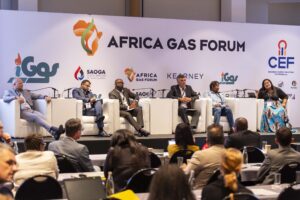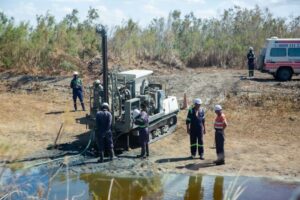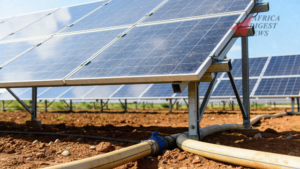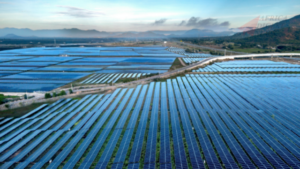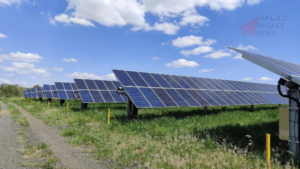
Written By: Faith Jemosop
Morocco is rapidly emerging as a frontrunner in sustainable aviation fuel (SAF) production within North Africa and the broader MENA region. As the global aviation industry intensifies efforts to reduce carbon emissions, sustainable aviation fuel offers a tangible path toward decarbonizing one of the hardest-to-abate sectors.
Morocco’s strategic location, abundant renewable energy resources, governmental commitment, and growing industrial ecosystem collectively position the country to become the regional hub for SAF production and supply.
Sustainable aviation fuel is produced from renewable sources such as biomass, agricultural residues, waste oils, or through synthetic processes powered by clean energy. It can reduce lifecycle carbon emissions by up to 80% compared to conventional jet fuel, making it a vital solution in the aviation sector’s quest for net-zero emissions.
1.Strategic Geographic Location:
Morocco’s geographic position at the gateway between Africa and Europe, along with proximity to the Middle East, is a critical asset. The country’s airports serve as key transit points on major flight routes connecting Europe, Africa, and the Americas. This prime location allows Morocco to efficiently distribute SAF to airlines operating within these corridors, facilitating easier and cost-effective supply logistics.
Royal Air Maroc’s pioneering SAF-powered flight from Marrakech to Paris in early 2025 highlights how Morocco’s location allows it to integrate sustainable fuels into high-traffic international routes. Morocco’s potential to become a regional SAF hub aligns with increasing SAF mandates in the European Union and other global markets that require minimum blending percentages of sustainable fuels in aviation.
Renewable Energy Potential
Morocco ranks among the global leaders in solar and wind energy development. The Noor Ouarzazate Solar Complex, spanning over 3,000 hectares, is one of the world’s largest concentrated solar power (CSP) plants, delivering massive clean energy capacity. Complemented by extensive wind farms across the country, Morocco’s renewable energy supply is both abundant and reliable.
SAF production, particularly e-fuels synthesized from green hydrogen, requires vast amounts of clean electricity. Morocco’s renewable resources enable the production of SAF with minimal carbon footprint, ensuring the fuel’s sustainability credentials are robust. By leveraging solar and wind energy, Morocco can produce SAF at scale without exacerbating fossil fuel dependence, a key differentiator compared to countries reliant on carbon-intensive grids.
Strong Government Support and Policy Framework
Morocco’s government has embedded clean energy and sustainable transport into its national development agenda. The Moroccan Ministry of Transport and Logistics has explicitly prioritized the integration of renewable energies within transport systems, aiming to boost energy efficiency and reduce emissions.
High-level commitments have translated into action, with Morocco signing significant renewable energy and green hydrogen agreements with international firms. For example, the OCP Group Morocco’s phosphate giant is partnering with French energy multinational Engie in a multibillion-euro investment plan focusing on green hydrogen, e-methanol, and SAF projects. These agreements aim to kick-start large-scale SAF production plants by the mid-2020s, signaling robust governmental backing.
Regulatory incentives and compliance with EU sustainable aviation fuel mandates provide additional market drivers for Morocco to develop its SAF industry. The government’s proactive role in facilitating industry partnerships, infrastructure development, and funding frameworks further solidifies its leadership ambitions.
Emerging Industrial and Innovation Ecosystem
Morocco’s industrial ecosystem is rapidly evolving to support sustainable fuel production. The country’s chemical and energy sectors are adapting to new technologies such as green hydrogen electrolysis and biomass conversion processes.
Notably, Swiss clean tech company Synhelion is exploring Morocco as a key site for its solar-powered synthetic fuel production. Synhelion’s technology uses concentrated solar energy to convert water and CO₂ into synthetic aviation fuels, a revolutionary process that Morocco’s abundant sunshine makes possible at scale.
Read also: Chinese To Invest $1.7 Billion in Ethiopia Mining ,Energy
The presence of strong research institutions and increasing collaboration between Moroccan and international companies fosters innovation, positioning Morocco to develop cutting-edge SAF technologies. This ecosystem will be critical to reducing production costs and improving the commercial viability of sustainable fuels.
Early Adoption and Demonstration Projects
Morocco’s early SAF initiatives validate its readiness to lead in this space. Royal Air Maroc operated its first SAF-powered commercial flight in February 2025, utilizing fuel derived from sustainable biomass and waste oils. This milestone demonstrated operational feasibility, significant carbon reductions (up to 33%), and regulatory compliance with European SAF blending mandates.
Such demonstration projects build confidence among industry stakeholders, attract investment, and accelerate broader SAF adoption. Morocco’s experience in integrating SAF on a commercial scale positions it as a regional role model.
Economic and Social Benefits, Beyond Environmental Impact
Developing a local SAF industry offers Morocco substantial economic advantages. It aligns with the country’s broader goals of economic diversification and industrial modernization, reducing dependency on fossil fuel imports.
SAF production can spur job creation in renewable energy, agriculture (for biomass feedstock), advanced manufacturing, and research sectors. It also promotes rural development by engaging farmers and local communities in supplying sustainable feedstocks like agricultural residues and non-food crops.
Morocco’s leadership in SAF could attract foreign direct investment and partnerships, boosting the national economy and enhancing regional competitiveness in green technologies.
Regional and Global Environmental Leadership
Morocco’s SAF ambitions carry significant environmental implications. The aviation sector accounts for approximately 2-3% of global CO₂ emissions, and its growth trajectory risks undermining climate goals. By scaling SAF production, Morocco can contribute to a substantial reduction in aviation emissions regionally and globally.
Also read: Is China Quietly Winning Africa’s Renewable Energy Race?
Morocco’s success can also inspire neighboring countries in Africa and the Middle East to adopt similar sustainable energy pathways, accelerating the continent’s clean energy transition. Its leadership in SAF production places Morocco at the forefront of Africa’s climate action efforts, strengthening its geopolitical standing as a green energy pioneer.
Challenges and the Path Forward
While Morocco’s potential is clear, several challenges must be addressed to realize its SAF leadership:
- High Production Costs: Current SAF production costs remain significantly higher than conventional jet fuel, requiring technological advancements and economies of scale.
- Infrastructure Development: Building the necessary supply chains, storage, and blending facilities demands substantial investment and coordination.
- Feedstock Availability: Ensuring sustainable, non-food feedstock supply without impacting food security or biodiversity is critical.
- Policy Harmonization: Aligning regional policies and securing international market access will be key to scaling exports.
Despite these challenges, Morocco’s strong foundational assets, proactive government, and growing partnerships provide a solid roadmap. Continued investments in technology, regulatory support, and international collaboration will be pivotal.
